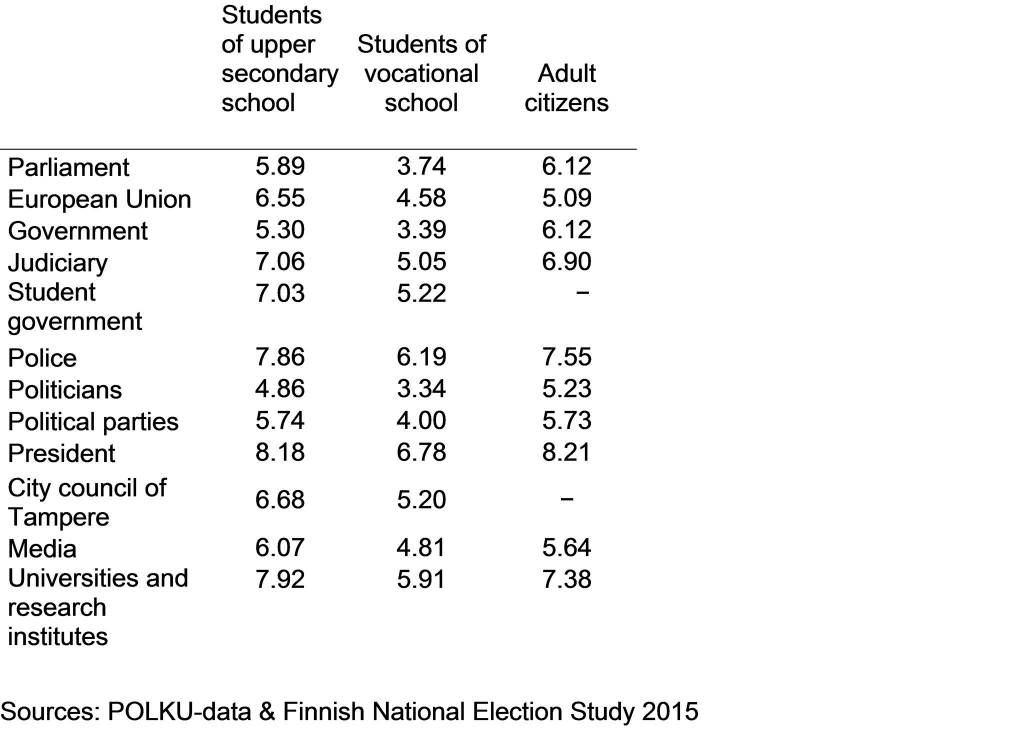In Finland, the students of upper secondary schools demonstrate significantly higher levels of political and social trust than the students of vocational schools.
This is shown by a recent study carried out by students of political science at University of Tampere in the spring 2016. The research team conducted a survey among the students of secondary level education in Tampere region, Finland. The data consisted of 929 respondents, out of which 68 percent were studying in an upper secondary school, 27 percent in a vocational school and 5 percent were completing a secondary level dual qualification.
In Finland, the compulsory teaching of social studies generally takes place on the 9th grade of comprehensive school. The main function of the social studies is to inspire students to see themselves as part of the larger society and to become informed and active citizens by providing comprehensive information about the society.
Students of upper secondary school are more engaged in politics than the students of vocational school. They are more interested and more likely to participate, and discuss about political issues at their school more frequently than students of vocational schools.
Teaching of social studies continues at the secondary level education, but has different goals in the upper secondary school and vocational school. While social studies at the vocational schools aim at providing the students a capacity to act according to their civic rights and duties, at upper secondary schools the students are prepared to participate and contribute to the society (Elo 2009).
Thus, it can be expected that in Finland, secondary level educational path divides the young people into groups that evaluate the political system and its institutions from different perspectives.
Indeed, the results of the study support this interpretation. Students of upper secondary school are more engaged in politics than the students of vocational school. They are more interested and more likely to participate, and discuss about political issues at their school more frequently than students of vocational schools.
Besides educational path, factors that explain the level of political trust of the respondents are satisfaction with the current economy, satisfaction with the government, and the level of income of their parents. The more satisfied with the economy and the government, and the wealthier the respondent’s household, the more trusting the respondent is towards political institutions.
There is no substantial difference on the levels of political trust of upper secondary school students and adult citizens, even though there are some difference, e.g. trust in the government and the European Union. Vocational school students’ level of political trust is clearly the lowest of these three groups. One interesting detail, for instance, is that the trust in the EU is much higher among upper secondary school students (6.55) than among adult citizens (5.09), not to mention vocational school students (4.58).
Trust in societal institutions on a scale from 0 to 10

The differences in the levels of political trust between secondary level students and adult citizens might be explained by the fact that young people do not have similar long-term political experiences as adults do. Their evaluations on topical political issues and current political actors play very significant role in shaping their trust in political institutions and political system as a whole. However, this is not to say that single actions of politicians wouldn’t affect the system support and the trust in the political system of adults as well (see e.g. Norris 1999, Bowler & Karp 2004, Hetherington 1998). The differentiation between specific and diffuse support is always difficult.
References:
Bowler, Shaun & Jeffrey Karp (2004), Politicians, Scandals, and Trust in Government. Political Behavior 26(3). 271–287.
Elo, Kimmo (2009), ”Kiinnostuksesta se kaikki lähtee… : Havaintoja äänestysikää lähestyvien nuorten politiikkatietämyksestä”. Kasvatus 40(1), 36–48.
Hetherington, Marc (1998), The Political Relevance of Political Trust. The American Political Science Review 92(4). 791–808.
Norris, Pippa (1999), “Introduction: the growth of critical citizens?” Teoksessa Pippa Norris (toim.): Critical Citizens: Global Support for Democratic Government. Oxford: Oxford University Press.


Comments